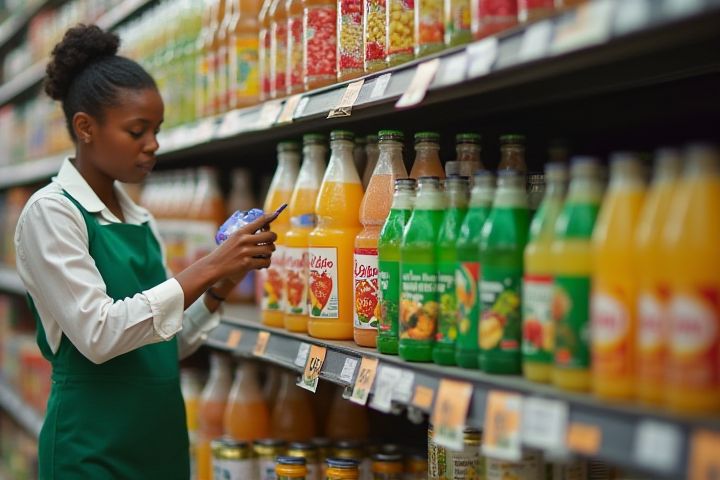
Fast-Moving Consumer Goods (FMCG) in Nigeria encompass a diverse range of products, including food, beverages, personal care items, and household necessities. This sector represents a significant portion of Nigeria's economy, driven by a rapidly growing population and increasing middle-class consumer spending. Major FMCG companies, such as Unilever, Nestle, and Nigerian Breweries, have established extensive distribution networks to meet urban and rural demands. E-commerce is gaining traction, providing convenience for consumers to access a variety of products directly. Understanding consumer behavior, preferences, and local market dynamics is crucial for businesses looking to thrive in Nigeria's competitive FMCG landscape.
Growing Middle Class Influence
The fast-moving consumer goods (FMCG) sector in Nigeria is increasingly shaped by the expanding middle class, which influences purchasing behaviors and brand preferences. This demographic shift has led to a surge in demand for quality products at competitive prices, prompting companies to innovate and diversify their offerings. As urbanization continues, FMCG brands are adapting their marketing strategies to resonate with the aspirations and values of this emerging consumer segment. Engaging with your target market through tailored promotions and localized products is essential for success in this dynamic landscape.
Urbanization and Population Growth
The fast-moving consumer goods (FMCG) sector in Nigeria is experiencing significant growth driven by urbanization and a rising population. With over 200 million residents, Nigeria's diverse consumer base is rapidly shifting towards urban centers, creating a heightened demand for essential products such as food, beverages, and household items. This demographic trend fosters an increasingly competitive market landscape, prompting FMCG companies to innovate and tailor their offerings to local preferences. Understanding these dynamics is crucial for businesses aiming to capture market share and thrive in this vibrant economy.
Local Production vs. Import
In Nigeria, the fast-moving consumer goods (FMCG) sector is increasingly shifting towards local production to meet consumer demand and boost the economy. Local manufacturing reduces reliance on imports, enhancing supply chain resilience and fostering job creation within communities. Companies in the FMCG industry are investing in technology and infrastructure to improve production efficiency and quality, catering to Nigerian tastes and preferences. By prioritizing local sourcing and production, brands can strengthen their market position while contributing to sustainable economic growth in the region.
E-commerce Expansion
In Nigeria, the Fast-Moving Consumer Goods (FMCG) sector is experiencing a significant shift towards e-commerce expansion, driven by increasing internet penetration and mobile device usage. Major players like Nestle and Unilever are investing in digital platforms to enhance their distribution channels and meet the rising consumer demand for convenience. Online shopping platforms, such as Jumia and Konga, are collaborating with FMCG brands to facilitate seamless transactions and faster deliveries, thereby improving customer experience. As you tap into this growing market, understanding consumer behavior on digital platforms can provide valuable insights for strategic planning.
Regulatory Environment
The regulatory environment in Nigeria significantly impacts the fast-moving consumer goods (FMCG) sector, shaping operational strategies and compliance requirements for businesses. Key regulatory bodies such as the National Agency for Food and Drug Administration and Control (NAFDAC) enforce standards that ensure product safety and quality, influencing consumer trust. The Food and Beverage sector, a vital component of FMCG, is particularly affected by food safety regulations and labeling laws designed to protect public health. Adapting to these regulations not only helps in mitigating risks but also enhances brand reputation in this competitive market landscape.
Distribution Channel Complexity
FMCG (Fast-Moving Consumer Goods) in Nigeria face significant challenges due to the complexity of distribution channels influenced by the country's diverse geography and urbanization trends. The distribution landscape is characterized by a combination of wholesalers, retailers, and informal markets, necessitating tailored strategies to efficiently reach consumers. Your ability to navigate logistical hurdles, from supply chain management to understanding local market dynamics, is crucial for success. Moreover, leveraging technology and data analytics can enhance visibility in the distribution process, optimizing sales and inventory management in this competitive sector.
Brand Loyalty Trends
Brand loyalty trends in the Nigerian FMCG (Fast-Moving Consumer Goods) sector showcase a growing preference among consumers for brands that offer quality and affordability. Research indicates that local brands are gaining traction, with consumers increasingly valuing cultural relevance and sustainability in their purchasing decisions. Companies are adapting their marketing strategies to leverage social media platforms, creating targeted campaigns that resonate with younger demographics. You can see that businesses prioritizing customer engagement and personalized experiences are more likely to foster long-term loyalty in this dynamic market.
Impact of Inflation
The Fast-Moving Consumer Goods (FMCG) sector in Nigeria is significantly influenced by inflation, which affects product pricing, consumer purchasing behavior, and overall market dynamics. Companies must adapt their strategies to mitigate rising costs, often leading to price increases that can alienate price-sensitive consumers. Furthermore, inflation drives brands to innovate in product offerings and packaging, ensuring value while maintaining quality to meet consumer expectations. As a result, FMCG businesses must continuously analyze economic indicators and consumer trends to remain competitive in this challenging economic landscape.
Rise of Private Labels
The rise of private labels in Nigeria's fast-moving consumer goods (FMCG) sector is reshaping the market landscape. Retailers are increasingly developing their private label products to provide cost-effective alternatives to established brands, appealing to budget-conscious consumers. This trend is driven by a growing middle class and an increasing demand for quality and affordability in everyday products such as food, beverages, and personal care items. As you explore shopping options, consider how these private labels could offer both value and competitive choices in Nigeria's evolving retail environment.
Sustainability Initiatives
Nigerian FMCG companies are increasingly prioritizing sustainability initiatives to address environmental challenges and meet consumer demands for eco-friendly products. These initiatives include reducing plastic waste through biodegradable packaging and implementing energy-efficient practices in production facilities. Brands are also investing in sustainable sourcing, ensuring that raw materials are obtained responsibly to support local communities and ecosystems. By adopting these practices, you can support businesses that align with your values and contribute to a more sustainable future.
